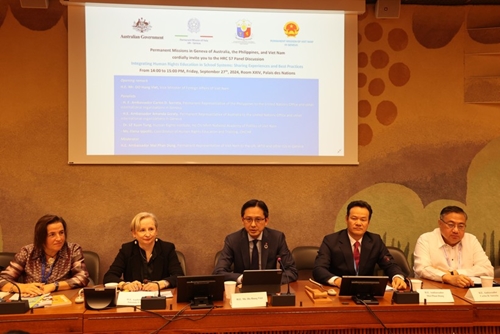Viet made the statement while delivering his opening remarks at an international seminar on integrating human rights education into education system co-sponsored by Vietnam, the Philippines, Australia and Italy as he is attending the 57th regular session of the U.N. Human Rights Council (UNHRC)’s meeting to adopt Vietnam’s Universal Periodic Review (UPR) cycle IV report.
    |
 |
|
Deputy Minister of Foreign Affairs Do Hung Viet (center) at the international seminar in Geneva on September 27. |
Highlighting Vietnam’s efforts in the area, Viet said promoting education rights and human rights education is among Vietnam’s priorities during its membership of the UNHRC in the 2023-2025 tenure.
Vietnam hopes for further co-sponsorship of the seminar, creating a forum for nations to share their experiences and contribute to the preparation for the implementation of the fifth phase of the World Program for Human Rights Education (WPHRE) for the 2025-2029 period, he stated.
The Vietnamese diplomat held that although countries and international organizations have obtained various achievements in promoting human rights education, with the integration of it into school system as the core, and made efforts in promoting international cooperation in the area, it is necessary to enhance experience and knowledge sharing since not many countries have provided information for the program yet.
Dr. Le Xuan Tung, from the Institute for Human Rights under the Ho Chi Minh National Academy of Politics (HCMA), shared Vietnam’s implementation of its project on engaging human rights education in formal education with several standout results, including organizing training courses for teachers and lecturers, compiling and publishing documents related to the field, incorporating human rights education into the education system and setting up partnership between the HCMA and the Australian Human Rights Commission.
Sharing their stories, representatives from other countries and regions underscored the important role of schools, families, society and competent parties in educating human rights for children.
Elena Ippoliti, of the Office of the High Commissioner for Human Rights Research Division, said a comprehensive approach to human rights education is the combination of policy building, ways to carry out the policies, process and teaching and learning tools, capacity building for teachers and education staff and learning environment.
Source: VNA